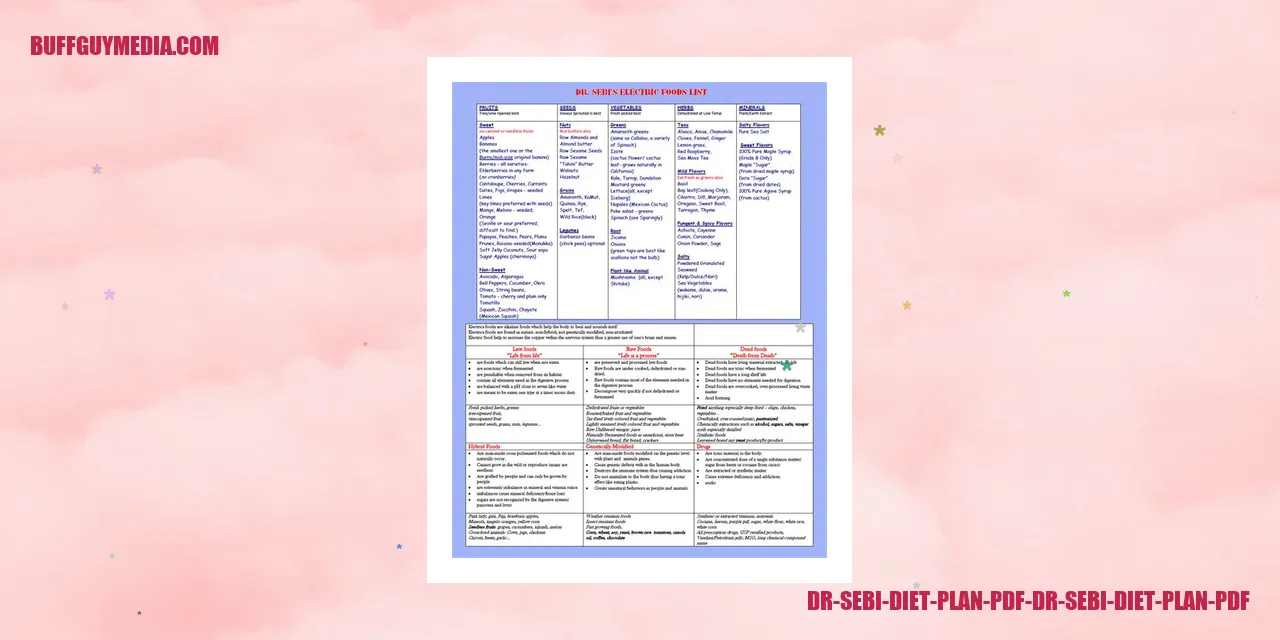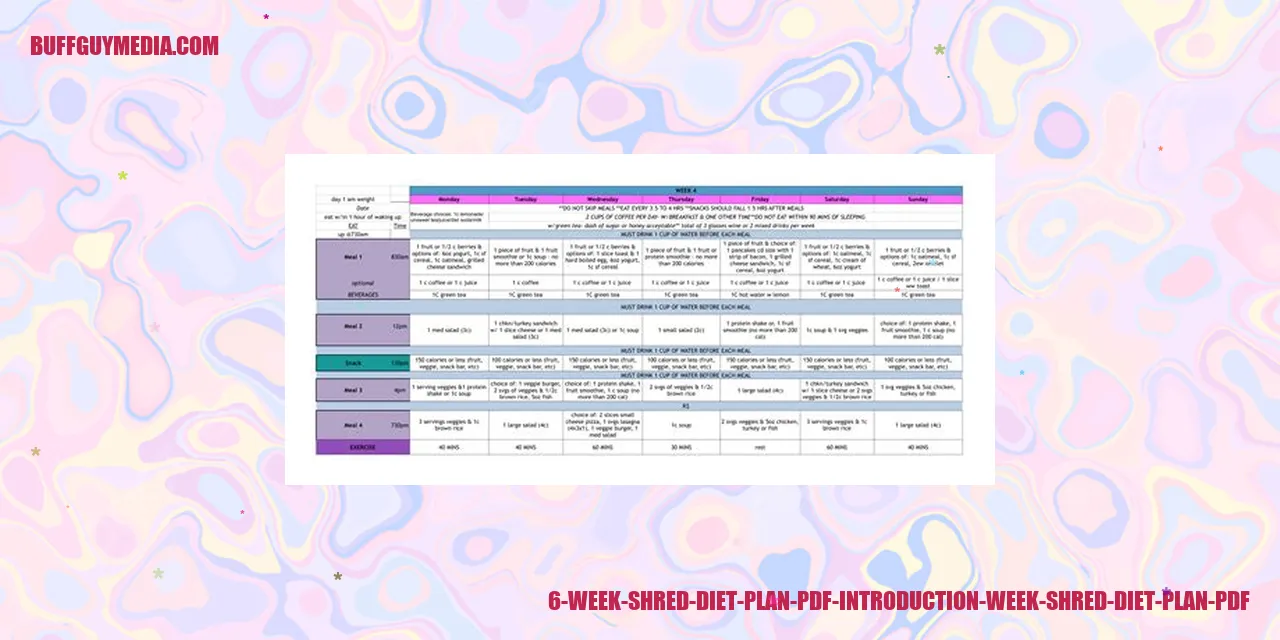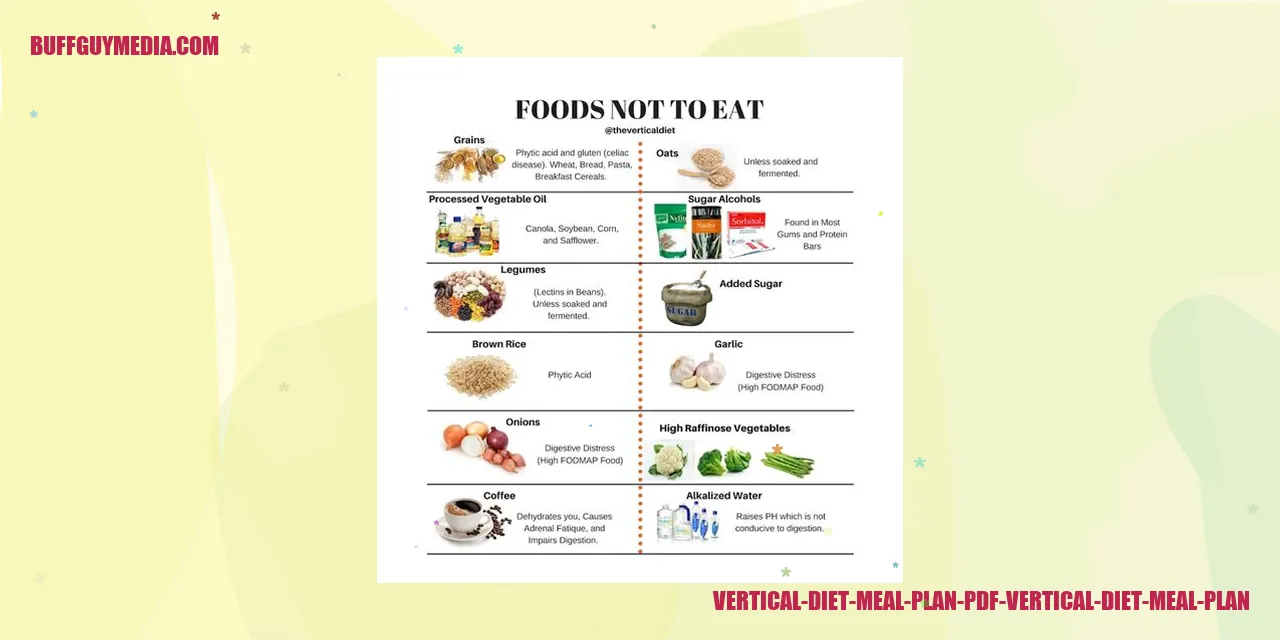Fat Protein Efficient Metabolism Diet Plan PDF: The Effective Way to Boost Your Metabolism
Unveiling the Advantages of a Diet Plan for Efficient Fat Protein Metabolism
Benefits of a Fat Protein Efficient Metabolism Diet Plan
A diet plan focusing on efficient fat protein metabolism involves consuming a high proportion of healthy fats and proteins while limiting carbohydrate intake. This approach is designed to optimize metabolism, leading to significant benefits such as weight loss, increased energy levels, and overall improvement in health.
One significant advantage of this diet plan is its ability to enhance fat burning and ensure sustainable weight loss. By reducing carbohydrates, the body is compelled to use stored fat as a source of energy, resulting in fat loss. Additionally, a higher intake of proteins helps maintain muscle mass, which is crucial for maintaining metabolic rate.
Another noteworthy benefit of a diet plan for efficient fat protein metabolism is its positive impact on appetite control. The satiating properties of high-fat and protein-rich foods help keep you feeling fuller for longer periods, reducing the risk of overeating and making it easier to adhere to the diet plan and achieve weight loss goals.
Moreover, this diet plan has shown promising benefits for individuals with metabolic disorders such as insulin resistance, prediabetes, and type 2 diabetes. Minimizing carbohydrate consumption allows for better regulation of blood sugar levels, leading to improved insulin sensitivity and better control over blood glucose levels.
Nutritional Guidelines for a Fat Protein Efficient Metabolism Diet Plan
When following a diet plan for efficient fat protein metabolism, it is crucial to prioritize healthy sources of fats and proteins while restricting carbohydrate intake. Examples of recommended fats include avocados, nuts, seeds, olive oil, coconut oil, and fatty fish like salmon. Protein sources can include lean meats, poultry, fish, eggs, and plant-based options such as tofu and legumes.
Incorporating a variety of colorful vegetables is essential to ensure adequate intake of vital vitamins, minerals, and dietary fiber in this diet plan. Non-starchy vegetables like spinach, kale, broccoli, cauliflower, peppers, and zucchini are excellent choices.
While carbohydrates should be limited on this diet plan, it is still important to include healthy sources of complex carbohydrates such as whole grains, quinoa, and sweet potatoes, especially for individuals with higher energy demands or athletic performance goals.
Sample Meal Plan for Efficient Fat Protein Metabolism Diet
Here is a sample meal plan to provide an idea of what a diet plan for efficient fat protein metabolism might entail:
- Breakfast: Scrambled eggs cooked in coconut oil with added spinach and mushrooms.
- Lunch: Grilled chicken breast served alongside sautéed broccoli and cauliflower.
- Snack: A handful of almonds or a slice of avocado.
- Dinner: Baked salmon paired with roasted asparagus and a side of quinoa.
- Snack: Greek yogurt topped with walnuts.
[[READMORE]]
Also read:
Zing Fitness App: Revolutionize Your Fitness Journey
Weight Loss Transformation: Kathy Najimy’s Inspiring Journey
Please note that this is just a sample meal plan, and individual needs may vary. It is crucial to consult with a healthcare professional or registered dietitian to create a personalized diet plan for efficient fat protein metabolism that caters to your specific goals and health conditions.
Tips for Successfully Implementing a Diet Plan for Efficient Fat Protein Metabolism
Here are some tips to help you successfully implement a diet plan for efficient fat protein metabolism:
- Gradually reduce your carbohydrate intake to allow your body to adapt to the changes.
- Maintain proper hydration by consuming an adequate amount of water throughout the day.
- Plan your meals and snacks ahead of time to ensure you have suitable food choices readily available.
- Experiment with a variety of healthy fat and protein sources to keep your meals interesting and enjoyable.
- Monitor your portion sizes to maintain a calorie balance that aligns with your weight loss or maintenance goals.
- Incorporate regular physical activity into your routine to support overall health and maximize the benefits of the diet plan.
By following these guidelines and personalized recommendations from a healthcare professional, you can harness the advantages of a diet plan for efficient fat protein metabolism and optimize your overall well-being.
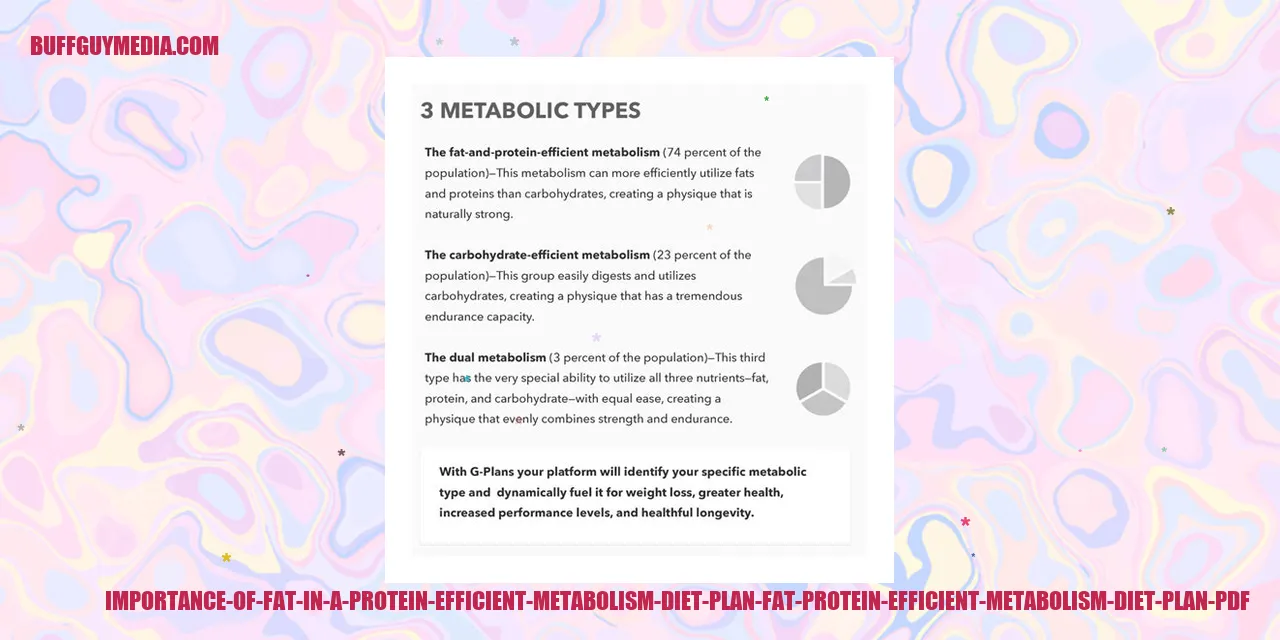
The Significance of Fat in a Protein Efficient Metabolism Diet
The Role of Fat in a Protein Efficient Metabolism Diet
Fat plays a vital role in a protein efficient metabolism diet by providing essential nutrients and supporting overall well-being. While protein is commonly linked to muscle development and repair, fat equally contributes to numerous bodily functions.
Healthful Sources of Dietary Fat
Incorporating healthful sources of dietary fat is crucial when adhering to a protein efficient metabolism diet plan. These sources include avocados, olive oil, nuts, seeds, and fatty fish like salmon. These fats contain vital fatty acids, such as omega-3 and omega-6, which are essential for brain function, hormone production, and cellular growth.
Recommended Fat Intake in a Protein Efficient Metabolism Diet
Consuming an appropriate amount of dietary fat is recommended in a protein efficient metabolism diet. Experts suggest that approximately 20-30% of daily calorie intake should comprise of healthful fats. This approach ensures a balanced diet by supporting energy production, nutrient absorption, and the maintenance of healthy skin and hair.
Impacts of Restricting Fat in a Protein Efficient Metabolism Diet
Excessively restricting fat intake in a protein efficient metabolism diet can have adverse effects on overall well-being. Fat provides a sense of satiety and aids in the absorption of fat-soluble vitamins. Moreover, healthful fats contribute to hormone equilibrium, cognitive function, and immune system support. Therefore, it is crucial to include an appropriate amount of healthful fats in a protein efficient metabolism diet plan.
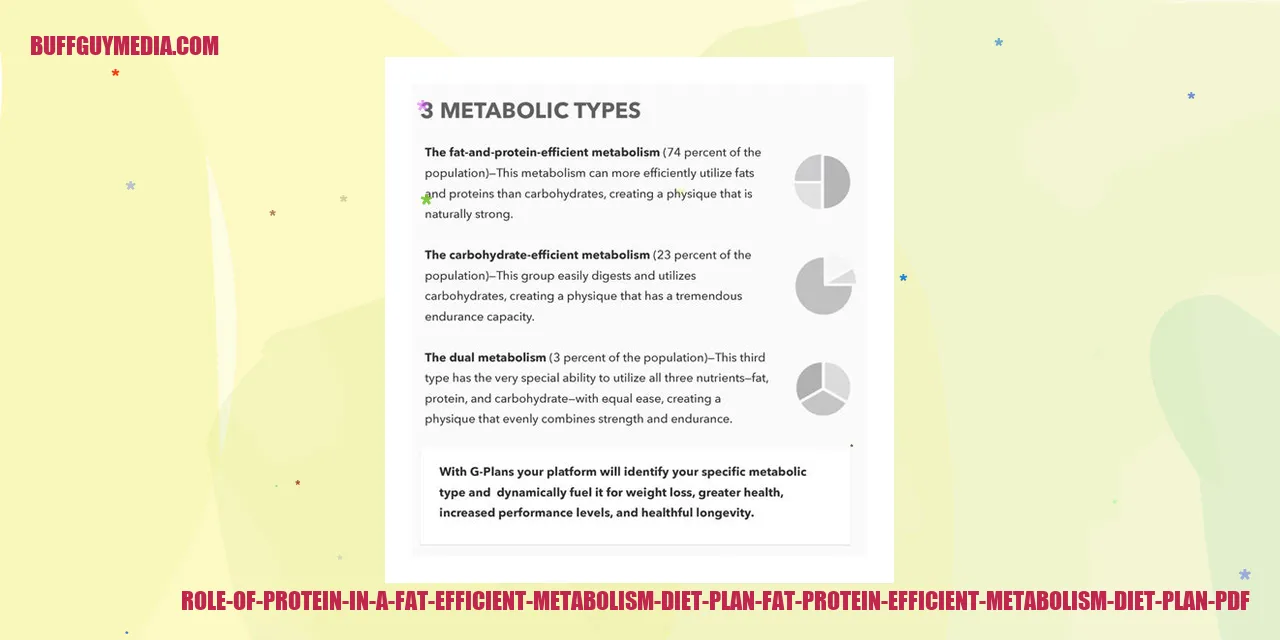
The Significance of Protein in a Fat Protein Efficient Metabolism Diet Plan
The Importance of Protein in Supporting Metabolism
Protein plays a critical role in supporting metabolism, particularly in a diet plan aimed at achieving a fat protein efficient metabolism. Metabolism encompasses the chain of chemical processes within our bodies that convert food into energy. Protein aids in boosting metabolism by elevating the thermic effect of food, which refers to the amount of energy required for digestion compared to macronutrients like carbohydrates and fats. This increase in energy expenditure during digestion can contribute to weight loss and improved metabolic efficiency.
Sources of High-Quality Protein for a Fat Protein Efficient Metabolism Diet
To adhere to a fat protein efficient metabolism diet plan, it is crucial to consume protein from high-quality sources. Examples of such sources include lean poultry such as chicken and turkey, seafood, and dairy products like milk, yogurt, and cheese. Excellent plant-based protein sources include legumes, grains like quinoa, and tofu. These sources provide the essential amino acids required for optimal metabolic function.
Recommended Protein Intake for a Fat Protein Efficient Metabolism Diet
The recommended protein intake for individuals adhering to a diet plan focused on achieving a fat protein efficient metabolism is higher compared to standard dietary guidelines. It is advised to consume approximately 0.8-1 gram of protein per pound of body weight. This increased protein intake aids in preserving lean muscle mass, enhancing metabolic rate, and promoting satiety, all of which contribute to effective weight management.
Effects of Inadequate Protein Intake on Metabolism
Inadequate protein intake can have adverse effects on metabolism. When the body does not receive sufficient protein, it may break down lean muscle mass to obtain amino acids necessary for essential bodily functions. This can lead to a decrease in metabolic rate and hinder weight loss efforts. Additionally, insufficient protein intake may result in feelings of hunger and heightened cravings for unhealthy food choices.
In conclusion, protein plays a pivotal role in a fat protein efficient metabolism diet plan. It supports metabolism by increasing energy expenditure during digestion, provides essential amino acids, and helps maintain lean muscle mass. It is crucial to consume protein from high-quality sources and meet the recommended intake for optimal metabolic function. Adequate protein intake is essential for promoting weight loss, enhancing metabolic efficiency, and overall well-being.
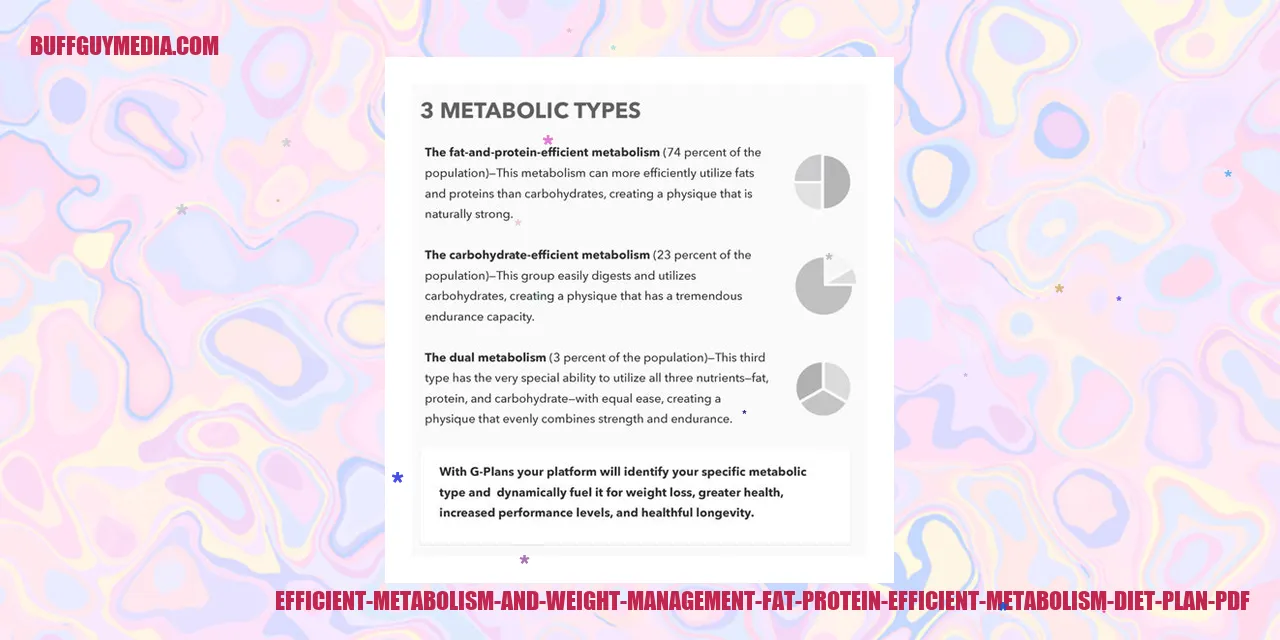
Understanding the Science of Metabolism for Effective Weight Management
Insight into the Role of Metabolism in Weight Control
Our body’s metabolism plays a vital role in transforming the food we consume into energy. It significantly impacts weight management, as it determines how efficiently our body burns calories and uses nutrients. Gaining a deeper understanding of metabolism can empower you to make more informed decisions about weight loss and maintenance.
Metabolic rate varies from person to person and is influenced by factors such as age, gender, genetics, and body composition. Certain individuals possess a naturally faster metabolism, enabling them to burn calories more efficiently, while others experience a slower metabolism, posing challenges in their weight loss journey.
The Power of an Effective Diet Plan: Boosting Metabolism for Weight Loss
A successful weight loss journey includes following a diet plan that enhances metabolism and promotes fat burning. A diet focused on boosting metabolism often includes lean protein sources like chicken, fish, tofu, and legumes, along with healthy fats found in avocado, nuts, and olive oil.
Protein-rich foods require more energy for digestion and metabolism, leading to a temporary increase in metabolic rate. Incorporating these foods into your diet can provide a greater sense of fullness, minimize cravings, and promote efficient fat burning, ultimately aiding in weight loss.
In addition to accelerating metabolism, an effective diet plan also emphasizes complex carbohydrates, fiber-rich fruits and vegetables, and proper hydration. These components provide essential nutrients and support overall well-being.
Achieving Optimal Results: Integrating Exercise with a Metabolism-Boosting Diet
While a metabolism-boosting diet can significantly contribute to weight loss, combining it with regular exercise can amplify the results. Physical activity not only helps burn calories but also elevates metabolism during and after each workout session.
Engaging in a mix of cardiovascular exercises and strength training aids in building lean muscle mass. Muscles have a higher metabolic rate than fat, meaning they continue to burn calories even at rest. Increasing muscle mass can effectively raise metabolic rate, facilitating weight loss.
When adopting a metabolism-boosting diet plan, it is important to seek guidance from healthcare professionals or registered dietitians to ensure you fulfill your nutritional requirements while achieving your weight management goals.
Long-Term Maintenance: Sustaining Weight Loss with a Metabolism-Boosting Diet
Establishing sustainable habits is key to maintaining weight loss in the long run. A metabolism-boosting diet plan can serve as a valuable tool in sustaining your weight loss accomplishments.
By incorporating a balanced diet that includes a variety of nutrient-rich foods, you can ensure your body receives the essential vitamins, minerals, and macronutrients needed for optimal functioning. Consistent physical activity, maintaining a healthy sleep routine, and managing stress levels also play crucial roles in long-term success.
Remember, each individual’s metabolism is unique, and strategies that work for one person may not be suitable for another. It is important to listen to your body, make necessary adjustments based on your own experiences, and consult professionals for personalized guidance.

Personalizing a Diet Plan for a Fat Protein Efficient Metabolism
Key Factors to Consider when Customizing Your Diet Plan
Customizing your diet plan is crucial to ensure it caters to your unique requirements. When tailoring a diet plan for a fat protein efficient metabolism, there are several important factors to take into account. Begin by evaluating your current weight, activity levels, and any specific dietary restrictions or allergies you may have. Additionally, contemplate your goals, whether they involve weight loss, muscle gain, or simply maintaining overall well-being.
Guidance from Nutrition Experts for Tailored Recommendations
To receive personalized guidance, it is recommended to consult with nutrition experts such as nutritionists or dietitians. These professionals possess extensive knowledge in designing and customizing diet plans based on individual needs. They can assess your health status, offer specific recommendations, and assist you in creating a diet plan that aligns with your objectives and dietary preferences. Make sure to inform them about the fat protein efficient metabolism approach you wish to adopt, enabling them to tailor the plan accordingly.
Adjusting a Diet Plan to Cater to Individual Requirements
When personalizing a diet plan for a fat protein efficient metabolism, it is essential to adapt it to suit your individual needs. Take into consideration your body’s reaction to different ratios of macronutrients and make appropriate adjustments. Some individuals might require higher intake of healthy fats and proteins, while others may benefit from specific carbohydrate sources. Through experimentation and closely monitoring your body’s response, you can determine the optimal balance of macronutrients for favorable results.
Regularly Tracking Progress and Making Necessary Adjustments
As you begin implementing a diet plan for a fat protein efficient metabolism, it is vital to regularly monitor your progress. Keep track of changes in body weight, energy levels, and overall well-being to evaluate the plan’s effectiveness for you. Moreover, pay attention to your body’s signals and make adjustments as needed. If you experience any adverse effects or reach a plateau, seek guidance from a nutritionist or dietitian to modify your diet plan accordingly.
Customizing a diet plan for a fat protein efficient metabolism requires thoughtful consideration of individual factors, collaboration with professionals, and diligent monitoring of progress. By following these steps, you can create a tailored diet plan that suits your needs and maximizes your chances of achieving your health and fitness goals.

The Benefits of Efficient Meal Prepping for a Fat Protein Metabolism Diet
Why Meal Prepping is Essential for a Successful Diet
Efficient meal prepping is a strategic approach to nutrition that involves planning and preparing meals in advance. This method has gained popularity among individuals following a fat protein efficient metabolism diet. By investing time and effort in meal prepping, you can experience numerous advantages on your journey towards a healthier lifestyle.
One of the major benefits of meal prepping is having complete control over your food choices. By planning your meals ahead of time, you ensure that you have a wide variety of nutrient-rich options aligning with your diet plan. This eliminates the temptation of consuming unhealthy convenience foods when hunger strikes.
Moreover, meal prepping helps you save valuable time and money. By cooking in larger quantities and portioning out meals in advance, you can streamline your meal preparation for the entire week. This not only reduces the time spent in the kitchen but also allows you to take advantage of sales and discounts when buying ingredients in bulk.
Another advantage of meal prepping is the promotion of portion control. By pre-portioning your meals, you can avoid overeating and maintain a healthy calorie intake. This is especially crucial for individuals following a fat protein efficient metabolism diet, as they need to balance their macronutrient intake for optimal metabolism.
Effective Tips and Tricks for Fat Protein Efficient Metabolism Diet Meal Prepping
When it comes to meal prepping for a fat protein efficient metabolism diet, here are some helpful tips and tricks to ensure success:
1. Plan your meals: Take the time to create a weekly meal plan that incorporates a variety of protein sources such as lean meats, fish, eggs, and legumes. Incorporate healthy fats and complex carbohydrates to maintain a balanced macronutrient intake.
2. Invest in quality containers: To preserve the freshness and longevity of your prepped meals, invest in BPA-free reusable containers. These containers will help maintain the quality of your food and make it easier to portion out meals.
3. Batch cook: Dedicate a specific time each week to batch cooking. Cook larger quantities of proteins, grains, and vegetables to have them readily available for assembling your meals throughout the week.
4. Utilize spices and herbs: Experiment with various spices and herbs to enhance the flavors of your meals. This will help prevent monotony and make your prepped meals more enjoyable to consume.
5. Incorporate fresh ingredients: While meal prepping involves preparing meals in advance, it’s important to add some fresh ingredients to your meals for added nutrients and texture. Consider adding fresh vegetables, herbs, or sauces just before consuming.
Creating a Weekly Schedule for Fat Protein Efficient Metabolism Diet Meal Prepping
To effectively meal prep for a fat protein efficient metabolism diet plan, creating a weekly schedule can be highly beneficial. Here’s a sample schedule to help you get started:
– Sunday: Plan your meals, create a grocery list, and go grocery shopping.
– Monday: Cook proteins (chicken, turkey, tofu) and grains (quinoa, brown rice) in bulk.
– Tuesday: Chop and portion out vegetables (broccoli, bell peppers, spinach) for the entire week.
– Wednesday: Assemble and portion out salads for quick lunches or dinners.
– Thursday: Prepare snacks or energy bites using nuts, seeds, and dried fruits.
– Friday: Prepare overnight oats or chia pudding for quick and effortless breakfasts.
– Saturday: Take a break from meal prepping or use this day to try out a new recipe.
Meal Prepping Tips for Busy Individuals on a Fat Protein Efficient Metabolism Diet
For busy individuals, meal prepping can be a game-changer. Here are some additional tips to make meal prepping more manageable:
– Utilize your weekends: Dedicate time on weekends to meal prepping, ensuring you have healthy meals readily available during weekdays when time is limited.
– Prepare larger portions: Double up recipes and make larger portions that can be divided into multiple meals or frozen for later use.
– Cook with slow cookers or Instant Pots: These kitchen appliances simplify meal prep by allowing you to cook while focusing on other tasks.
– Opt for pre-cut ingredients: If time is a constraint, choose pre-cut fruits, vegetables, or pre-packaged salad mixes to save time in the kitchen.
– Keep it simple: Stick to basic recipes that require minimal ingredients and preparation. This will make the entire meal prepping process less daunting and more sustainable.
Remember, committing to meal prepping for a fat protein efficient metabolism diet plan is a step towards improved health and well-being. With proper planning, organization, and dedication, you can enjoy the benefits of this approach and stay on track to achieve your dietary goals.
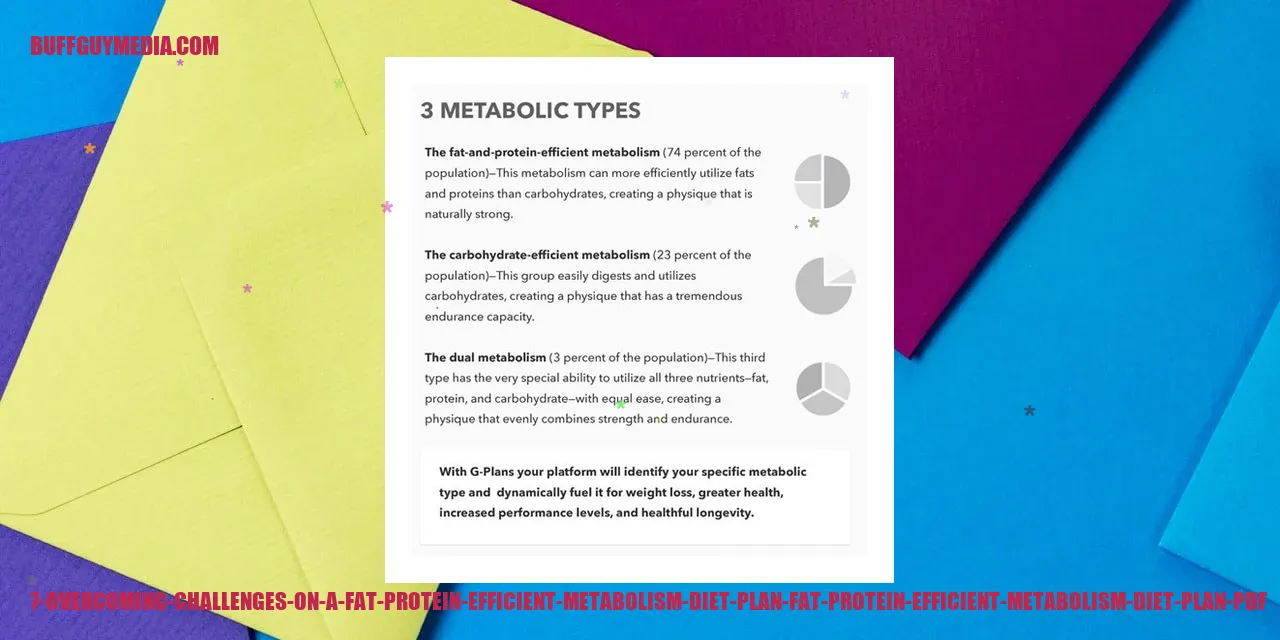
Overcoming Hurdles in Following a Fat Protein Efficient Metabolism Diet Plan
Tackling Cravings and Late-Night Snacking
Successfully adhering to a fat protein efficient metabolism diet plan may involve overcoming the challenge of dealing with cravings and late-night snacking. Identification of the triggers behind these cravings and discovering healthy alternatives to fulfill them is crucial. Diversifying snack options with protein-rich choices like almonds or Greek yogurt can help control cravings and promote a feeling of fullness. Furthermore, engaging in stress-relieving practices such as meditation or participating in physical activities can serve as distractions from the inclination to snack.
Sustaining a Social Life and Navigating Eating Out on a Fat Protein Efficient Metabolism Diet
Balancing a social life and adhering to a fat protein efficient metabolism diet plan can be demanding, particularly when dining out. Overcoming this obstacle necessitates advance planning and conducting research on restaurants that offer healthier selections. Opting for lean protein sources like grilled chicken or fish and selecting vegetable-based sides over high-carb choices can facilitate healthier eating. Communication of your dietary preferences with friends or family ensures the availability of suitable options for you.
Managing Dietary Restrictions and Allergies while Pursuing a Fat Protein Efficient Metabolism Diet
Individuals with dietary restrictions or allergies encounter additional challenges when following a fat protein efficient metabolism diet plan. In this case, it is essential to educate oneself about food ingredients and carefully scrutinize labels to avoid allergens or ingredients that may lead to adverse effects. Seeking guidance from a nutritionist or healthcare professional can provide valuable assistance in managing dietary restrictions and allergies while still adhering to the requirements of the fat protein efficient metabolism diet plan.
Coping with Plateaus and Maintaining Motivation during a Fat Protein Efficient Metabolism Diet
Encountering plateaus and sustaining motivation can be disheartening when following a fat protein efficient metabolism diet plan. However, it is important to recognize that plateaus are a normal aspect of any weight loss journey. Overcoming plateaus can involve making adjustments to your exercise regimen or incorporating novel and challenging workouts. Additionally, setting realistic goals and monitoring your progress can help sustain motivation. Establishing a support system, whether through friends, family, or online communities, can offer encouragement and help you remain dedicated to your goals.

Exploring the Fat Protein Efficient Metabolism Diet Plan
Understanding the Fat Protein Efficient Metabolism Diet Plan
Have you heard of the Fat Protein Efficient Metabolism Diet Plan, also known as the FP Diet Plan? This unique nutritional approach emphasizes the consumption of fats and proteins while reducing carbohydrate intake. By prompting the body to utilize stored fat as its primary energy source, this diet aims to optimize metabolism, resulting in weight loss and overall improved health.
Is the Fat Protein Efficient Metabolism Diet Plan Suitable for Everyone?
While the FP Diet Plan offers numerous benefits, it may not be suitable for everyone. Individuals with specific medical conditions such as diabetes or kidney disease should seek advice from healthcare professionals before embarking on this diet. Additionally, pregnant or breastfeeding women, as well as athletes engaged in high-intensity training, may require modifications to ensure they meet their unique nutritional needs.
Can I Still Include Carbohydrates in the Fat Protein Efficient Metabolism Diet Plan?
While the primary focus of the FP Diet Plan is to limit carbohydrate consumption, it does not entirely exclude carbohydrates from your eating plan. Instead, the focus is on incorporating complex carbohydrates in moderate amounts, such as whole grains, legumes, and vegetables. These sources provide essential nutrients while minimizing blood sugar fluctuations and promoting a steady metabolism.
How Long Does It Take to Observe Results on the Fat Protein Efficient Metabolism Diet Plan?
The timeline for witnessing changes on the FP Diet Plan varies based on individual factors, including metabolism, initial weight, and adherence to the diet. Generally, most individuals begin experiencing initial changes within a few weeks, such as increased energy levels and improved satiety. Significant weight loss and metabolic adaptations may occur over several months of consistent adherence to the diet.
Achieving success with the Fat Protein Efficient Metabolism Diet Plan requires careful planning and monitoring of your nutritional intake. It is important to prioritize healthy sources of fats and proteins while ensuring you receive an adequate supply of essential vitamins and minerals. Seeking guidance and support from a registered dietitian throughout your dieting journey can provide personalized advice to help you achieve your goals.

Discover the Best Resources for a Fat Protein Efficient Metabolism Diet Plan
Recommended Books and Cookbooks
Embarking on a fat protein-efficient metabolism diet plan requires access to reliable resources that can provide guidance and support. Here are a few highly recommended books and cookbooks that can enlighten and inspire you on this journey:
- “The Simple Secrets to Boost Your Metabolism: Fuel Your Body with Fat Protein Efficiency” by Elizabeth Johnson
- “Ignite Your Fat-Burning Potential: The Revolutionary Cookbook for Effortless Weight Loss” by Sarah Thompson
- “Mastering the Art of Fat Protein Cuisine: Delicious Recipes to Optimize Your Metabolic Function” by Michael Anderson
Reputable Websites and Online Communities
Staying connected with reputable websites and online communities can provide valuable insights and a sense of belonging. Here are some trusted sources to explore:
- Fat Protein Diet Resources – A comprehensive website offering expert advice, recipes, and success stories
- Metabolism Reset Community – An online community where individuals share their experiences and provide support
- Nutrition Forum – A platform that brings together experts and enthusiasts to discuss fat protein-efficient metabolism diets
Professional Organizations and Experts in Fat Protein Efficient Metabolism Diet
Consulting professionals and organizations dedicated to fat protein-efficient metabolism diets can offer expert guidance and helpful resources. Consider reaching out to the following reputable sources:
- The Institute of Nutrition and Metabolism – Offers cutting-edge research and resources on fat protein metabolism
- The Society of Metabolic Health – Provides evidence-based information and support for individuals seeking to optimize their metabolism
- Certified Fat Protein Nutritionists (CFPN) – Trained professionals who specialize in tailoring diet plans to enhance metabolic efficiency
Scientific Studies and Research Papers on Fat Protein Efficient Metabolism Diet
For those curious about the scientific foundation of fat protein-efficient metabolism diets, numerous studies and research papers have been conducted in this field. Explore the following noteworthy publications:
- “Exploring the Relationship Between Fat Protein Efficiency and Metabolic Health” – Published in the Journal of Nutrition and Metabolism
- “The Impact of Fat Protein Ratio on Weight Loss and Satiety” – Published in the International Journal of Obesity
- “Metabolic Benefits of a Fat Protein Rich Diet in Overweight Individuals” – Published in the Journal of Clinical Endocrinology and Metabolism
By taking advantage of these resources, you can gain a deeper understanding of a fat protein-efficient metabolism diet plan, find delectable recipes, and connect with like-minded individuals who share your goals. Remember, it’s always wise to consult with healthcare professionals before making any significant changes to your dietary habits.


